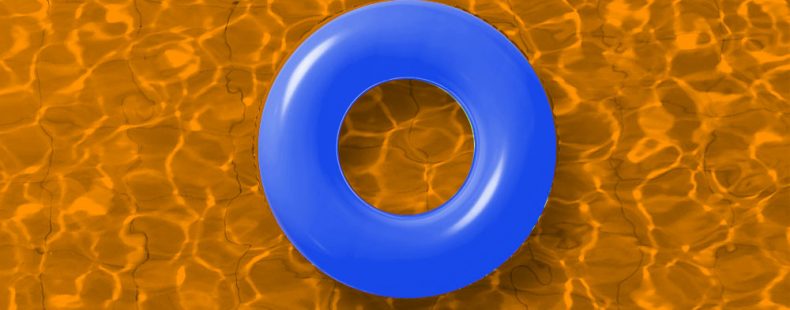The color blue has a lot of symbolic meaning that is reflected in the English language. Expressions like feeling blue and blue state are just two examples of where we see blue in everyday expressions. But what are opposites of blue? We are going to take a close look at the literal opposite of blue, the color orange, and some of its symbolic meanings. We will also look at some of the meanings of blue and their opposites throughout history, from the American Civil War to today. You may be surprised at just how many opposites of blue there are!
🟠 Orange is a secondary color
The color blue is a primary color, one of the foundational three colors, along with red and yellow. Its complementary color, or the color that sits directly opposite blue on the color wheel, is orange. Orange is a secondary color produced by mixing two primary colors, red and yellow.
Shades of orange
Mixing primary and secondary colors further creates tertiary colors, “a color, as brown, produced by mixing two secondary colors.” Combining orange with red and yellow produces various shades of orange that sit opposite shades of blue on the color wheel. These colors are known as red-orange or yellow-orange.
Shades of red-orange include:
- cadmium
- rust
- tangerine
Shades of yellow-orange include:
- marigold
- apricot
- champagne
You can brighten up your language with these additional words for the color orange.
Orange is a warm color
The color orange is what is known in color theory as a warm color. This probably doesn’t come as a surprise to you because heat is often represented as orange, such as flames or the sun. Warm colors are thought to produce energetic feelings and are seen as bold and bright. Other warm colors are yellow and red. Blue, in contrast, is a cool color.
Orange is a symbol of enlightenment
In Hindu and Buddhist religious traditions, monks and other pious people wear clothes of saffron, a yellowish-orange color. The color saffron in these traditions is thought to be representative of illumination or enlightenment, because it resembles the color of the rising sun. It is associated with a renunciation of the material world and purity.
Orange symbolizes transformation
In Confucianism, orange is a symbol of transformation. This is connected to the principle of balance or yin and yang. Yellow symbolizes light and spirituality, red symbolizes fire and sexuality. The combination of red and yellow produces orange, the balance of these characteristics. Its opposite, blue, represents stability and changelessness, as we can see in the expression true-blue, meaning “unchangingly true.”
Red symbolizes Republicans
In the American context, it is not only orange that is a color opposite to blue. If we move away from the color wheel and consider the symbolic uses of blue, other opposites emerge. For example, blue is used as shorthand to mean “relating to, supporting, or belonging to the Democratic Party; Democratic.” (In the British context, blue means instead “politically conservative.”) The opposite of this sense of blue is red, in the sense “Republican.” Ironically, the word Red has historically been used as a disparaging term for Communists.
Gray symbolizes the Confederacy
Another example of an opposite of blue from American history can be found in language from the Civil War. During the War, the Union soldiers fought in blue uniforms, and were known as the Blue. Their opponents, the Confederacy, fought in gray uniforms and were known as the Gray. For this reason, the two sides of the War are sometimes referred to as “the Blue and the Gray.”
Rose symbolizes optimism
As we mentioned in the introduction, there are many expressions in English that use the word blue. One such example is feeling blue, meaning “feeling depressed in spirits, dejected, melancholy.” The opposite of this meaning of blue is rose or rosy, “cheerful or optimistic.” We can see this sense of the meaning of rose in the expression rose-colored glasses, meaning “a cheerful or optimistic view of things, usually without valid basis.”
Shine a light on the difference between optimistic and pessimistic.
Blue isn’t decent
One of the meanings of the word blue is “indecent; somewhat obscene; risqué” as in the phrase, a blue joke. While we don’t have a handy color to symbolize the antonym of blue in this sense, we can come up with some words to use instead. Some opposites of indecent include:
- wholesome
- chaste
- modest
Blue is blasphemous
One of the slightly dated uses of the word blue is to mean “marked by blasphemy.” Blasphemy, from the Greek blásphēmos, means “impious utterance or action concerning God or sacred things.” While the color white often symbolizes purity, the word itself is not often used in quite this way. So, some opposites of blue with the meaning of “marked by blasphemy” that one can use instead are:
- godly
- pious
- reverent
Blue is drunk
This may come as no shock to Australian readers, but others may be surprised to learn that the word blue is used in slang to mean “drunk; intoxicated.” This use of the word is attested to in British slang from the 18th century. While blue in this sense has largely fallen out of use in the United States and the United Kingdom, it hangs on in Australia and New Zealand. The opposite of blue to mean “drunk” is sober, from the Latin sōbrius, which literally means “not drunk.”
From Eastern religions to American history, there are many different ways to think of opposites of blue. You can test your knowledge of them with our quiz here.














